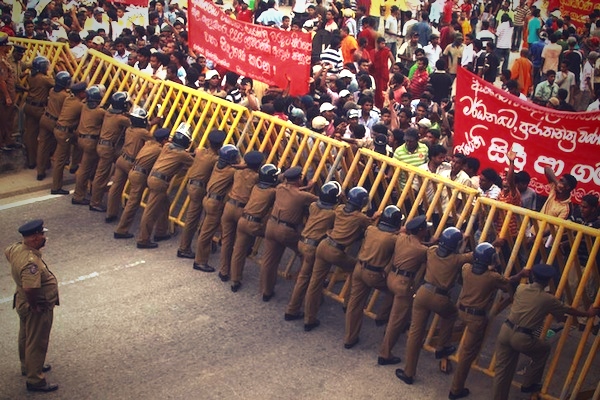Sri Lanka begins military-led training for university entrants
COLOMBO |
(Reuters) - Sri Lanka on Monday began compulsory military-led training for thousands of university entrants, despite protests by opposition-backed student unions that called it the government's latest move to militarise the country.President Mahinda Rajapaksa's government has ordered 22,000 university entrants to attend what it calls "leadership and positive-thinking training" for three weeks at 28 military camps islandwide. The first 12,000 began on Monday.
Sri Lanka's traditionally influential student unions have long been bellwethers of political unrest. They were key parts of the deadly 1971 and 1988-89 insurrections led by the Marxist Janatha Vimukthi Peramuna (JVP), or People's Freedom Party.
"We commenced these theoretical and practical training courses to develop leadership ability and positive attitudes," Higher Education Minister S.B. Dissanayake told Reuters.
The largest student union, the Inter University Students Federation (IUSF), rejected the training as a government method of coercing political support. The IUSF has long been seen as the student wing of the JVP, which is now in opposition.
"This is another step of this dictatorial government's agenda of militarising the society," IUSF leader Sanjeewa Bandara told Reuters.
He said the IUSF did not mind receiving training, but said it should be given by mutual consent and not by force.
"They are trying to terrify and suppress students by conducting the training forcibly in military camps so they can have a loyal group of students to fulfil their political agendas," Bandara said.
The IUSF has filed a Supreme Court challenge against the training. The court asked if the programme could be delayed by a week to give it time to rule, but the government refused.
Rights groups and opposition critics have said the Rajapaksa administration has spread military influence into every corner of government since defeating the Tamil Tigers' three-decade separatist insurgency two years ago.
Most of the top military commanders have been given diplomatic or other influential government posts since the war's end. Soldiers are being used in post-war rebuilding efforts and even sold vegetables after floods in January and February ruined crops and prompted hoarding by private vendors.
Dissanayake defended the programme as aimed at giving students skills they need to succeed in the private sector.
"This training course is not a weapons training or military training. We think that university students should be fortified with the weapon of knowledge," he said. "This is only one programme aimed at creating a disciplined generation."
(Writing by Bryson Hull; Editing by Nick Macfie)
Removing the Emperor’s Clothes
 *groundviews journalism For citizens
*groundviews journalism For citizens
Why military style leadership training for university students of Sri Lanka?
Original image from Lanka Polity
Universities, academics and university students have been hogging the limelight in the last several weeks in unprecedented ways. The Rajapakse regime’s systematic destruction of the higher education system in this country has run into a few impediments. University academics from around the country have emerged from a partly self-induced exile and have finally started making themselves heard. On the other hand, the preposterous scheme of sending new entrants to the university for ‘leadership training’ to military camps has also provoked a series of protests. Whatever the outcome of the academics trade union action or the protests against the ‘leadership training’, higher education in our country will never be the same again. We will be able to assess in a few months, if this will lead to a victory for higher education in Sri Lanka or the further strengthening of the totalitarian Rajapakse project. The stakes are huge. And the regime knows this, which is why it is pulling out all its heavy guns against this unprecedented level of dissent.&&&&&&&&&&&&&&&&&&&&&&&&&&&&&&&&&&&&
Some thoughts on the Buddha and his teaching
 May 17, 2011, 12:00 pmby Professor Emeritus
May 17, 2011, 12:00 pmby Professor EmeritusY. Karunadasa PhD
As we all know, the Buddha was the founder of the religion that has come to be known today as Buddhism.

 By Ranga Sirilal
By Ranga Sirilal